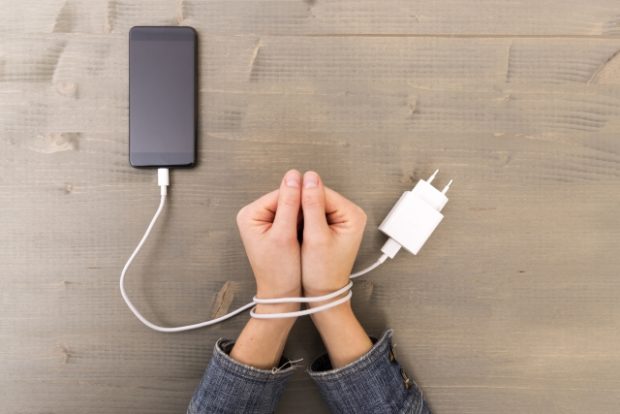Nomophobia: Fear of being without your smartphone could lead to problematic use

Nomophobia could lead to dangerous or even illegal smartphone use, an Australian study reveals. Image: Getty Images/artursfoto via AFP Relaxnews.
Have you ever tried switching off your smartphone for a whole day? Now an essential part of our daily lives, mobile phones have many obvious advantages, so long as you don’t end up becoming totally addicted to your device. A study from researchers in Australia revealed that nomophobia, the fear of being without your mobile phone, could lead to behaviors that are dangerous for your health and other people’s.
Scientists from Monash University, Melbourne have been investigating nomophobia — “no mobile phone phobia” — or the fear of being without your mobile phone. The condition affects many more people than you might think and could prove dangerous for our health and well-being.
The study, published in the International Journal of Environmental Research and Public Health on Aug. 19, 2020, polled 2,838 participants on their usage habits, as well as their psychological attachment to their smartphone. Conducted in Australia — a country that counts 109.6 mobile-cellular subscriptions per 100 inhabitants (compared to 103.5 per 100 inhabitants worldwide) — the study found that 99.2% of participants reported some form of nomophobia, or some degree of fear of not having their smartphone with them.
In detail, while more than 8 in 10 volunteers were experiencing a mild to moderate level of nomophobia, no less than 13.2% of the sample were considered to be suffering from severe nomophobia.
‘Nomophobes’ and dangerous behavior
The researchers observed that the greater the level of nomophobia experienced by participants, the more likely they were to engage in dangerous or even illegal behavior. The scientists found that more than 4 in 10 participants (43%) spent more than three hours a day using their smartphone and that high usage was directly linked to a high level of nomophobia and a high risk of problematic dependency, prohibited use and dangerous use.
Unsurprisingly, young people from 18 to 25 had the highest levels of nomophobia and males were around twice as likely to engage in dangerous smartphone usage than females. The study has also shown that people experiencing nomophobia were 10 times more likely to use their smartphone in a prohibited space and 14 times more likely to use their smartphone in dangerous ways, such as while driving.
“Our results provide evidence for the notion that exhibiting a fear of being without one’s mobile phone can lead to problematic dependent, prohibited or dangerous use, each factor of which may pose significant health risks, such as over-use, anti-social use or reckless and physically compromising use,” the researchers said. CC
RELATED STORIES:
Using smartphones among Filipinos’ top daily activities
Mobile games thrive, even as pandemic keeps players home